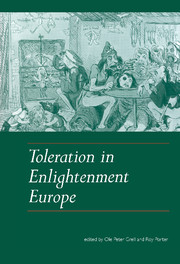Book contents
- Frontmatter
- Contents
- List of contributors
- Preface
- 1 Toleration in Enlightenment Europe
- 2 Toleration and the Enlightenment Movement
- 3 Multiculturalism and Ethnic Cleansing in the Enlightenment
- 4 Intolerance, the Virtue of Princes and Radicals
- 5 Spinoza, Locke and the Enlightenment Battle for Toleration
- 6 Toleration and Enlightenment in the Dutch Republic
- 7 Toleration and Citizenship in Enlightenment England: John Toland and the Naturalization of the Jews, 1714–1753
- 8 Citizenship and Religious Toleration in France
- 9 A Tolerant Society? Religious Toleration in the Holy Roman Empire, 1648–1806
- 10 Enlightenment in the Habsburg Monarchy: History of a Belated and Short-Lived Phenomenon
- 11 Toleration in Eastern Europe: the Dissident Question in Eighteenth-Century Poland–Lithuania
- 12 Toleration in Enlightenment Italy
- 13 Inquisition, Tolerance and Liberty in Eighteenth-Century Spain
- Index
3 - Multiculturalism and Ethnic Cleansing in the Enlightenment
Published online by Cambridge University Press: 03 February 2010
- Frontmatter
- Contents
- List of contributors
- Preface
- 1 Toleration in Enlightenment Europe
- 2 Toleration and the Enlightenment Movement
- 3 Multiculturalism and Ethnic Cleansing in the Enlightenment
- 4 Intolerance, the Virtue of Princes and Radicals
- 5 Spinoza, Locke and the Enlightenment Battle for Toleration
- 6 Toleration and Enlightenment in the Dutch Republic
- 7 Toleration and Citizenship in Enlightenment England: John Toland and the Naturalization of the Jews, 1714–1753
- 8 Citizenship and Religious Toleration in France
- 9 A Tolerant Society? Religious Toleration in the Holy Roman Empire, 1648–1806
- 10 Enlightenment in the Habsburg Monarchy: History of a Belated and Short-Lived Phenomenon
- 11 Toleration in Eastern Europe: the Dissident Question in Eighteenth-Century Poland–Lithuania
- 12 Toleration in Enlightenment Italy
- 13 Inquisition, Tolerance and Liberty in Eighteenth-Century Spain
- Index
Summary
If the meaning of words were accessible only to those who actually employed them, neither multiculturalism nor ethnic cleansing could have been intelligible to anyone in the age of Enlightenment. In addressing themselves to what is always local and peculiar, historians must be specially attentive to their use of words, alert to anachronisms and the perils of ascribing timeless significance to ideas plucked out of context like magician's rabbits from a bottomless hat. Multiculturalism and ethnic cleansing are terms which pertain to the political world of the late twentieth century, in one case predominantly with respect to notions of community generated in North America, in the other with respect to the conduct of a civil war in Bosnia. My choice of title here is deliberately anachronistic, not because I believe that our current political vocabularies would have had the same resonance 200 years ago but, rather, because I am convinced that certain features of the discourse of the civic and religious life of the seventeenth and eighteenth centuries have persisted and thus remain strikingly familiar, rather than alien, in our time.
The allegedly Eurocentric or, alternatively, gendered nature of Enlightenment philosophy is often identified as underpinning the most blameworthy practices of intolerance today, and in the light of the Holocaust – made possible according to some commentators by the self-destructive tendencies of Enlightenment notions of science and reason – it has come to be maintained that ‘the fallen nature of modern man cannot be separated from social progress’.
- Type
- Chapter
- Information
- Toleration in Enlightenment Europe , pp. 69 - 85Publisher: Cambridge University PressPrint publication year: 1999
- 2
- Cited by

